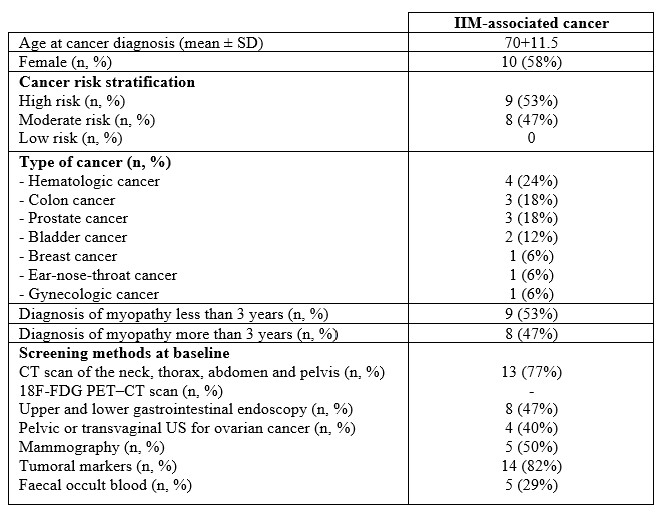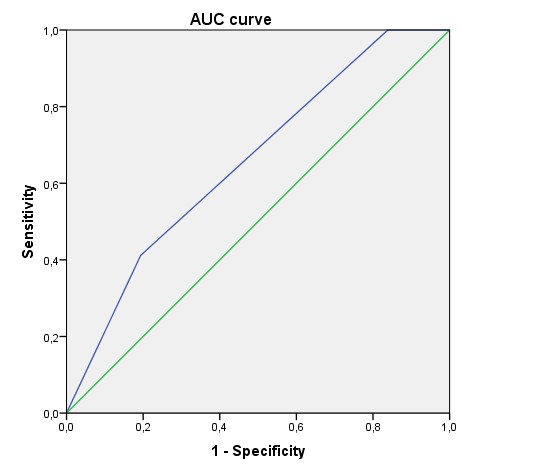Session Information
Date: Sunday, November 17, 2024
Title: Muscle Biology, Myositis & Myopathies – Basic & Clinical Science Poster II
Session Type: Poster Session B
Session Time: 10:30AM-12:30PM
Background/Purpose: Idiopathic inflammatory myopathies (IIM) carry an elevated risk of cancer incidence. Recently published International Guidelines for IIM-associated cancer screening from the Myositis Assessment and Clinical Studies Group (IMACS) initiative were published to provide recommendation on cancer risk stratification and screening modalities. We aim to apply the IMACs cancer risk stratification model in a retrospective cohort of IIM patients, evaluate its diagnostic accuracy and screening potential for identifying patients with IIM with associated malignancy.
Methods: A retrospective cohort study involving IIM patients, meeting the 2017 ACR/EULAR criteria, was conducted. Sociodemographic, clinical, immunological, and treatment data were extracted from medical records. The IMACS guidelines were employed for cancer risk stratification, categorizing patients into different risk levels. Statistical analyses encompassed descriptive statistics, sensitivity, specificity, and accuracy metrics with 95% confidence intervals.
Results: We have included 80 patients diagnosed with idiopathic inflammatory myopathies (IIM), of whom 62.5% were female. The cohort exhibited a mean age of 62.2±26 years, with a mean duration of 5.6±6 years since diagnosis. Subtypes distribution comprised 30 patients (38%) with polymyositis, 27 (34%) with dermatomyositis, 10 with anti-synthetase syndrome (12.5%), 3 (3.8%) with overlap-myositis, 7 (9%) with immune-mediated necrotizing myopathy, and 3 (4%) with statin-associated myopathy. Notably, patients with a history of cancer were diagnosed at an older age (63.8±24 vs. 55.9±29, p=0.02). Additionally, this subgroup displayed a higher prevalence of Anti-MI-2a (18% vs. 6%), Anti-MDA5 (18% vs. 0%), and Anti-TIF1G (18% vs. 6%) positivity. Despite these differences, no discernible clinical and treatment distinctions were identified between the two groups. Of the total cohort, 17 (21%) were diagnosed with malignancy. Type of malignancy and screening panels used for cancer detection is provided in Table 1. IMACS risk characterization revealed 53% at high risk and 47% at moderate risk. This risk stratification model demonstrated robust diagnostic performance, with a sensitivity of 90% (95% CI 55-99.75%), specificity of 74.19% (95% CI 61.50-84.47%), and accuracy of 76.36% (95% CI 64.91-85.60%), as illustrated in Figure 1.
Conclusion: This study highlights the promising accuracy (76.4%) of the IMACS cancer risk stratification model in detecting malignancies among patients with IIM. The majority of identified malignancies manifest in the early phase, underscoring the importance of vigilant screening, especially in the initial years post-IIM diagnosis. These findings advocate for the incorporation of cancer risk assessment into the routine management of IIM, providing potential avenues for early detection and personalized interventions. The substantial proportion of patients classified with a moderate risk of cancer emphasizes the need for comprehensive screening efforts. The integration of the IMACS risk assessment into routine IIM management holds the potential to facilitate timely interventions and enhance overall patient outcomes.
To cite this abstract in AMA style:
Retuerto Guerrero M, Moriano C, sieiro santos c, Diez álvarez e. Stratification of Cancer Risk in Idiopathic Inflammatory Myopathies. Application of the IMACS Guidelines to Enhance Screening [abstract]. Arthritis Rheumatol. 2024; 76 (suppl 9). https://acrabstracts.org/abstract/stratification-of-cancer-risk-in-idiopathic-inflammatory-myopathies-application-of-the-imacs-guidelines-to-enhance-screening/. Accessed .« Back to ACR Convergence 2024
ACR Meeting Abstracts - https://acrabstracts.org/abstract/stratification-of-cancer-risk-in-idiopathic-inflammatory-myopathies-application-of-the-imacs-guidelines-to-enhance-screening/


